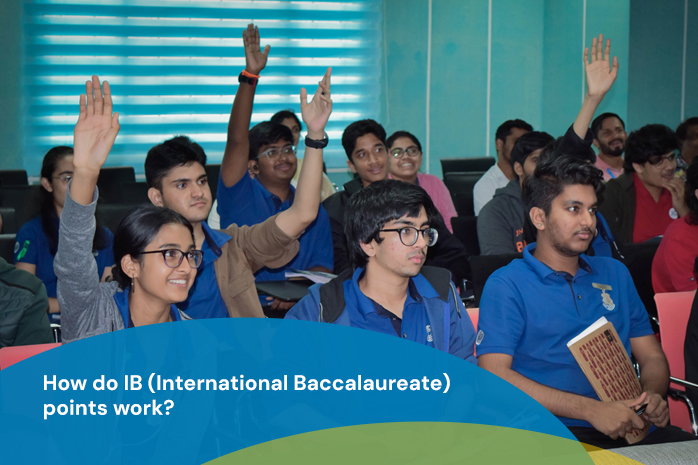International Baccalaureate’s Diploma Programme (IBDP) is an interdisciplinary programme that tests learners on multiple facets. In the two-year programme, how much the learners have learnt is measured through external examinations, internal assessments, research essay papers, and CAS, ToK, and EE grades. IBDP’s integrated format requires the learner to fulfil all programme requirements, including attending prescribed hours of classroom attendance to earn the Diploma. The programme is not difficult and supports learners in their education through a variety of activities. It is important to understand the course objective and assessment criteria to perform well.
In IBDP, there are six subject groups and a DP core. From the six subject groups, the learner must choose one subject each and they can choose one additional subject if they like. Of the 6 subjects, they have to opt to study a minimum of 3 subjects at Higher Level and the others they can study at Standard Level.
Six Subject Group |
DP Core |
|---|---|
|
|
The total score on the IB grading scale is 45 points and to obtain the diploma, the learner must score a minimum of 24 points and pass the minimum requirements of the core courses of the programme. Each of the six subjects that the learners choose is worth 7 points, so the total score from these is 42 points. To clear each subject, the learner must score at least 4 points. The DP core is graded and depending on the grades, learners can score up to 3 points.
In the IBDP subjects, 85% of marks are assigned to external assessment, which is the final written test that the learner will attempt. 15% marks are assigned to internal assessments which will include classroom attendance and participation, projects, and essays. The DP core is also internally assessed and graded. Not performing well, fulfilling the criteria or not attempting the DP core or internal assessment components will result in the learner not earning the diploma even if they score more than 24 marks. Generally, external exams are broken into at least two papers per subject. Again the number of assessments and programme requirements is higher for HL subjects compared to SL subjects. For instance, Science subjects such as Physics, Chemistry and Biology assessments can be broken down into -
DP core earns a letter grade and the grades are assigned a point. Learners have to do 150 hours of CAS and write a report on their activity and what they learnt to earn the grades. In the case of ToK and EE, the grid for grades and scoring are -
| Theory of Knowledge | Extended Essay | ||||||
| Excellent (A) | Good (B) | Satisfactory (C) | Mediocre (D) | Elementary (E) | Not Submitted (N) | ||
| Excellent (A) | 3 | 3 | 2 | 2 | 1+ Failing Condition | N | |
| Good (B) | 3 | 3 | 2 | 2 | Failing Condition | N | |
| Satisfactory (C) | 2 | 1 | 1 | 0 | Failing Condition | N | |
| Mediocre (D) | 2 | 1 | 0 | 0 | Failing Condition | N | |
| Elementary (E) | 1+Failing Condition | Failing Condition | Failing Condition | Failing Condition | Failing Condition | N | |
| Not Submitted (N) | N | N | N | N | N | N | |
Understand the course objective properly because DP assessments do not merely test the learner’s knowledge, they test their understanding and application too. The DP Core is a scoring area if you choose your activities and topics wisely. The EE and ToK assessments check the learner’s knowledge and understanding, so select an interesting topic that you won’t mind researching and writing about. Regularly practice past question papers because the essay and descriptive answers will require time and thought to complete. If you practice writing the papers, you will learn to time better for the exams.
IBDP is a focused pre-university course, so pick subjects that are relevant to your college programme and that you will find interesting. If you are dedicated to the course, organised and ensure that you schedule your activities, you will find it easier to prepare for the assessments and do well in them.
© Knowledgeum
